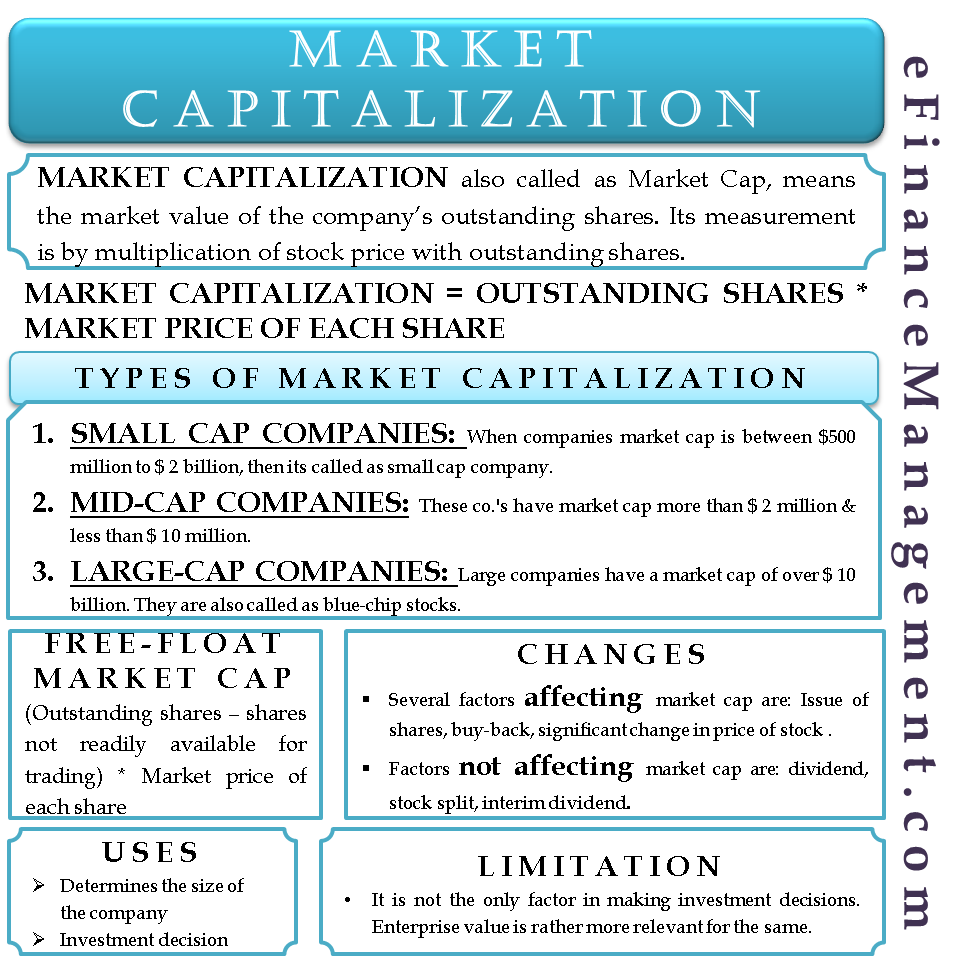What is Market Capitalization?
Market Capitalization, also called Market Cap, means the market value of the company’s outstanding shares. Its measurement is by multiplication of stock price with outstanding shares. Market value is a great measure to value the companies if the price to earnings ratio (P/E ratio) of the two companies is the same.
Market Capitalization Formula
The formula of Market Capitalization is as follows
Market Capitalization = Outstanding shares * Market price of each share
Where,
Outstanding shares mean the number of shares issued by the company. The market price of the share means the price prevailing in the market, i.e., the price you need to pay to purchase the share.
The Concept of Free-float Market Capitalization
Free float market capitalization considers only those shares which are readily available for trading in the market. Shares held by Promoters and the government are generally not available for trading in the market. For calculation of Free-float market capitalization, outstanding shares are reduced by a number of shares that are not available for trading.
Example of Market Capitalization & Free-float Market Capitalization
| Particulars | Company A |
| A. Outstanding shares | 5,000,000 (5 Million) |
| B. Numbers of shares held by Promoters | 1,000,000 (1 Million) |
| C. Number of shares readily available for trade (A-B) | 4,000,000 (4 Million) |
| D. Market price per share | $ 20 |
| E. Market Capitalization of a company (A*D) | $ 100,000,000 (100 Million $) |
| F. Free float market capitalization (C*D) | $ 80,000,000 (80 Million dollar) |
Types of Market Capitalization
Small-cap companies
- When companies market cap is between the US $500 million to the US $ 2 billion, then it would be called a small-cap company.
- Small-cap companies are considered risky for investment compared to mid & large-cap companies.
- Small companies generally have more growth potential.
Mid-cap companies
- The mid-cap company is those whose market cap is more than the US $ 2 million & less than the US $ 10 million.
- In a time of recession, a smaller company may get out of business but not the mid-cap companies.
- It has more growth potential compared to large-cap companies.
Large-cap companies
- Large companies have a market cap of over US $ 10 billion. They are also called blue-chip stocks.
- Large-cap stocks are comparatively safer than mid & small-cap companies.
- Large-cap companies information availability is higher compared to mid & small-cap companies.

Uses of Market Cap
Determines the size of the company
The market cap helps to determine the size of the company. The large market cap of the company reflects well-known companies within an established industry.
Also Read: Market Value of Equity Calculator
Investment decision
The market cap also defines a company’s stage in development. Large-cap stocks are considered more conservative than investments in small/mid-cap companies.
Limitations of Market Cap
Market cap can be helpful for decision-making, but it is not the only factor that can help the investor in an investment decision. This means an investor cannot make investment decisions on the basis of the market cap only. Enterprise value is more useful in the case of investment decisions.
Change in Market Cap
There are several factors that can impact the market cap of the company. The issue of shares by the company, buy-back/repurchase by the company, significant change in the price of the stock, i.e., sudden rise/fall in price, could impact market cap.
Market cap is not altered because of a stock split or dividend. However, the number of outstanding shares is increased because of the stock split, but the market price of the stock decreases. For example stock split is 2 for 1, which means 2 shares for 1 each. In this case, the share price will be half. The same will happen in the case of a dividend; the dividend amount will reduce the price of the share.


Hi,
I think the numbers on the Mid-Cap company valuations are off? I think it’s supposed to be 2-10 billion $, not million?
Thanks!